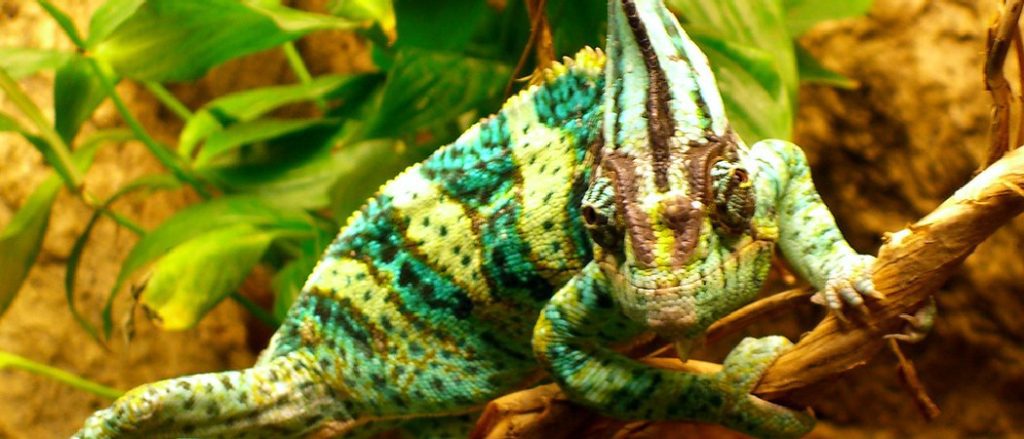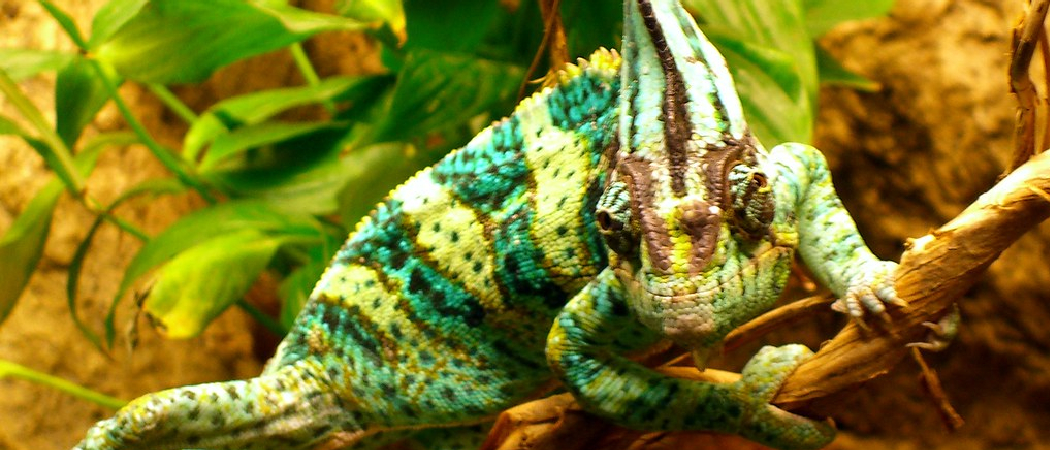If your chameleon is dying, signs may include lethargy, loss of appetite, and changes in coloration. Determining if your chameleon is dying can be distressing, but being observant of its behavior and appearance can help you evaluate its health.

Keep an eye out for any sudden or drastic changes in its behavior, such as a lack of movement or difficulty breathing. Additionally, a healthy chameleon should have a good appetite and vibrant, consistent coloration. If you notice any concerning signs, such as weight loss, mucus discharge, or irregular shedding, it is important to seek veterinary care as soon as possible to ensure the best chance of saving your chameleon’s life.
Remember, early detection and intervention can make a significant difference in your chameleon’s well-being.

Credit: www.nytimes.com
Recognizing Signs Of Illness
As a responsible chameleon owner, it is crucial to stay vigilant and aware of the health condition of your pet. Recognizing signs of illness early on can make a significant difference in the well-being and survival of your chameleon. In this section, we will discuss two broad areas to focus on when assessing your pet’s health: behavioral changes and physical symptoms.
Behavioral Changes
Chameleons are known for their unique behaviors and characteristics. However, any sudden or unusual changes in their behavior could indicate an underlying health issue. Here are some behavioral changes that you should be on the lookout for:
- Decreased appetite or refusing to eat
- Lethargy or lack of energy
- Abnormal sleep patterns or excessive sleeping
- Aggression or unusual aggression towards other chameleons (if you own multiple chameleons)
- Unusually frequent hiding
- Stress-related behaviors such as pacing, excessive yawning, or hissing
- Loss of balance or coordination
Physical Symptoms
While observing your chameleon’s behavior is essential, it is equally important to keep an eye out for any physical symptoms that may indicate illness. Here are common physical symptoms to watch for:
- Discolored skin or changes in skin texture
- Swelling or unusual growths, especially around the mouth or eyes
- Difficulty breathing or gaping
- Dehydration, indicated by sunken eyes or wrinkled skin
- Weight loss or excessive weight gain
- Open sores or wounds that do not heal
- Abnormal bowel movements, such as diarrhea or constipation
Remember, spotting these signs of illness does not necessarily mean that your chameleon is dying. However, prompt action is necessary to address any health concerns and ensure the best possible care for your beloved pet. If you notice any of the aforementioned behavioral changes or physical symptoms, it is recommended to seek professional advice from a veterinarian who specializes in reptiles. Regular veterinary check-ups and a well-maintained habitat can also go a long way in preventing illness and promoting a healthy and happy life for your chameleon.
Seeking Veterinary Care
When it comes to the health of your beloved chameleon, it is essential to stay vigilant and take action promptly if you suspect your pet may be dying. Seeking veterinary care is crucial in such distressing situations, as it’s the first step towards understanding what could be happening to your chameleon and potentially saving its life.
Finding An Exotic Pet Vet
Finding a reliable veterinarian who specializes in exotic pets like chameleons is paramount. These professionals possess the knowledge and expertise to diagnose and treat the unique health issues that chameleons may experience. To find an exotic pet vet in your area, consider the following:
- Ask for recommendations from fellow chameleon owners, reptile enthusiasts, or local reptile clubs.
- Search online directories or forums dedicated to exotic pet care for recommended veterinarians.
- Contact local animal hospitals or clinics and inquire if they have veterinarians experienced in treating chameleons or other reptiles.
- Ensure the vet you choose is licensed, experienced, and familiar with chameleon care.
Preparing For The Vet Visit
Before heading to the veterinarian’s office, there are a few essential steps you can take to ensure a smooth and productive visit:
- Observe and document: Pay close attention to your chameleon’s symptoms and behavior leading up to the visit. Take note of any changes in appetite, activity level, breathing patterns, or signs of distress. Pictures or videos can be helpful for the vet to understand the chameleon’s condition.
- Prepare a list of questions: Jot down any concerns or queries you have regarding your chameleon’s health. This will help you make the most of your time with the vet and ensure you don’t forget anything important.
- Gather necessary documents: Bring along your chameleon’s medical history, including details of previous illnesses, treatments, or medications. This information will assist the vet in understanding your chameleon’s health background.
- Transportation: Ensure your chameleon is comfortably and securely transported in a suitable carrier. Maintain the appropriate temperature and humidity levels during the journey, as chameleons are sensitive to environmental changes.
Remember, time is of the essence when you suspect your chameleon is dying. Acting swiftly and seeking veterinary care at the earliest signs of distress can significantly improve the chances of saving your beloved pet’s life.
Immediate Care And Support
If your chameleon is showing signs like loss of appetite, lethargy, and discoloration, it may be a sign that it is dying. Immediate care and support from a veterinarian is crucial to determine the cause and provide necessary treatment to save your chameleon’s life.
Creating An Ideal Environment
Creating an ideal environment for your chameleon is crucial when it comes to providing immediate care and support. Chameleons are highly sensitive creatures that require specific environmental conditions to thrive. Here are a few key factors to consider:
- Temperature and Humidity: Chameleons are ectothermic, which means they rely on their environment to regulate their body temperature. Ensure the temperature in their enclosure is between 70-85°F (21-29°C) during the day and slightly cooler at night. Additionally, maintain a humidity level of 50-70% to prevent dehydration.
- Lighting: Chameleons need access to UVB light for proper vitamin D3 synthesis and calcium absorption. Use UVB fluorescent bulbs specifically made for reptiles, and provide them with a 12-hour light cycle.
- Enclosure Size: Chameleons require spacious enclosures that allow them to climb and move freely. A cage size of at least 2 feet tall and 2 feet wide is recommended for most species.
- Branches and Foliage: Mimicking their natural habitat is vital. Incorporate plenty of branches and live plants in the enclosure to provide hiding spots, climbing opportunities, and a sense of security.
Offering Proper Nutrition
Giving your chameleon the right nutrition is essential to support their immediate care needs. Chameleons are insectivores, meaning their diet primarily consists of live insects. Here are a few tips to ensure a well-balanced diet:
- Gut-Loading Insects: Before feeding the insects to your chameleon, gut-load them with nutrient-rich foods such as leafy greens, fruits, and high-quality commercial diets. This ensures your chameleon receives essential vitamins and minerals.
- Variety in Insect Selection: Offer a diverse range of insects such as crickets, roaches, mealworms, and waxworms to provide a balanced mix of nutrients.
- Dusting with Calcium: Dusting the insects with a calcium supplement is vital for chameleons, as it aids in their bone health and prevents metabolic bone disease. Use a calcium supplement with added vitamin D3.
- Hydration: Chameleons may not drink from water bowls, so ensure they are provided with a misting system to simulate rain. Mist their enclosure several times a day to maintain hydration.
Providing Comfort And Support
When a chameleon is feeling unwell or nearing the end of its life, providing comfort and support can make a significant difference. Here are a few ways you can ensure your chameleon feels as comfortable as possible:
- Quiet Environment: Minimize loud noises and sudden disturbances around the chameleon’s enclosure. Provide a calm and peaceful environment for them to recover or spend their final moments.
- Appropriate Handling: If your chameleon is weak or fragile, avoid excessive handling unless necessary. Always approach them with gentle and slow movements to prevent unnecessary stress.
- Temperature Regulation: Ensure the temperature and humidity levels in the enclosure are consistently maintained within the recommended range. Fluctuations can exacerbate stress and hinder recovery.
- Observation and Care: Monitor your chameleon closely and look out for any signs of improvement or worsening health. Provide any necessary medications or supplements as prescribed by a veterinarian.

Credit: en.wikipedia.org

Credit: venngage.com
Frequently Asked Questions On How Do I Know If My Chameleon Is Dying
Why Is My Chameleon Losing Its Appetite?
Chameleons can lose their appetite due to various reasons such as stress, illness, inadequate husbandry, or environmental changes. It is important to identify the underlying cause and make necessary adjustments to the chameleon’s habitat or seek veterinary help if needed.
What Are The Signs Of A Dying Chameleon?
Signs of a dying chameleon may include lethargy, loss of appetite, weight loss, abnormal coloring, difficulty breathing, and sunken eyes. If you notice these symptoms, it is crucial to seek immediate veterinary care to increase the chances of saving your chameleon’s life.
How Can I Help My Sick Chameleon?
If you have a sick chameleon, consult a reptile veterinarian immediately. They will examine the chameleon, recommend appropriate treatments, and provide guidance on husbandry improvements. Follow their advice regarding temperature, humidity, diet, and any medication or supplements necessary for your chameleon’s recovery.
Conclusion
Recognizing the signs of a dying chameleon can be a deeply concerning experience for any pet owner. By being attentive to changes in behavior, appetite, and appearance, you can quickly identify if your chameleon is in distress. Seeking veterinary care promptly is crucial in giving your pet the best chance for recovery and survival.
Remember, your chameleon’s health and well-being should always be a top priority.


